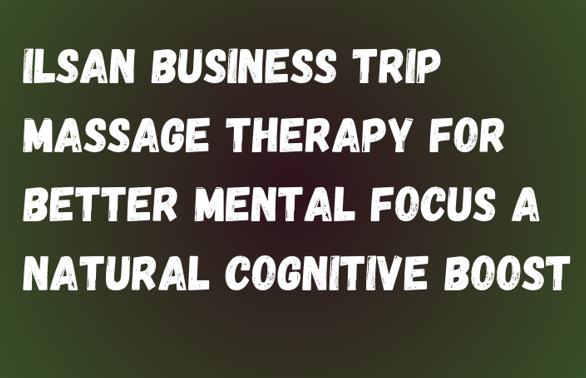In a world brimming with constant demands and distractions, maintaining mental clarity and focus can feel like an uphill battle. Digital notifications, workplace stress, and personal responsibilities often compete for our attention, leaving us mentally drained and unable to concentrate. While numerous strategies exist to enhance cognitive function, ranging from meditation to nootropic supplements, one method often overlooked is massage therapy. Surprisingly, massage not only relaxes the body but also sharpens the mind. Here’s how it works and why you should consider incorporating it into your routine.
The Connection Between Stress and Focus
To understand 일산출장안마 massage therapy impacts mental focus, it’s essential first to examine the relationship between stress and cognitive function. Stress, whether physical or mental, triggers the body’s fight-or-flight response. This releases cortisol, a hormone that, in high amounts, can impair memory, attention, and decision-making. Chronic stress exacerbates these effects, leading to a foggy mind and reduced productivity. Massage therapy, as a powerful stress-relief tool, counters these effects by reducing cortisol levels and promoting relaxation. When the body is less tense, the mind becomes freer to focus, improving mental clarity and cognitive function.
How Massage Therapy Enhances Cognitive Function
Massage therapy influences the mind through various physiological and psychological mechanisms:
Improved Circulation and Oxygen Flow: Massage stimulates blood circulation, increasing the flow of oxygen and nutrients to the brain. Better circulation ensures that your brain receives the resources it needs to perform optimally, enhancing focus and concentration.
Lowered Cortisol and Increased Serotonin: Studies have shown that massage therapy significantly reduces cortisol levels while increasing serotonin and dopamine, neurotransmitters associated with happiness and relaxation. The balance of these chemicals creates an environment in which your brain can work more effectively, with less interference from anxiety or stress.
Alleviation of Physical Discomfort: Physical discomfort, such as tension in the neck and shoulders, can be a significant distraction. Massage relieves these aches and pains, allowing you to concentrate better. For individuals who spend long hours at a desk or staring at screens, this benefit is particularly relevant.
Better Sleep Quality: Sleep is critical for cognitive performance, yet stress and discomfort often disrupt it. Regular massage therapy promotes more profound, more restful sleep, giving your brain the time it needs to recover and consolidate information, ultimately improving memory and focus.
Types of Massage for Mental Focus
Different types of massage cater to various needs. If your goal is improved mental clarity, here are some options worth exploring:
Swedish Massage: Known for its gentle, relaxing techniques, Swedish massage is excellent for reducing overall stress and promoting relaxation, which indirectly enhances focus.
Deep Tissue Massage: This type targets deeper layers of muscle and connective tissue, addressing chronic tension and pain that can distract the mind.
Reflexology: Focused on stimulating specific points on the hands, feet, and ears, reflexology is believed to impact brain function positively, enhancing concentration and reducing mental fatigue.
Shiatsu Massage: A Japanese massage technique that involves applying pressure to specific points on the body, Shiatsu helps balance energy and improve focus by releasing tension and enhancing blood flow.
Scientific Evidence Supporting Massage Therapy for Cognitive Benefits
Scientific studies have increasingly supported the idea that massage therapy can improve cognitive performance. A study published in the International Journal of Neuroscience found that participants who received massage therapy exhibited improved alertness and task performance. Similarly, research in Psychological Bulletin highlighted the positive effects of massage on anxiety reduction, indirectly boosting cognitive function. Moreover, studies on workplace wellness have revealed that employees who received regular massages reported increased productivity, better focus, and lower stress levels.
Practical Tips for Incorporating Hwajeong Business Trip Massage Therapy into Your Routine
1. Schedule Regular Sessions: Consistency is critical to reaping the mental benefits of massage. Aim for a session every two weeks or monthly, depending on your budget and schedule.
2. Pair Massage with Mindfulness Practices: Combining massage with mindfulness techniques, such as meditation or deep breathing, can amplify its effects on mental clarity.
3. Focus on Problem Areas: If you experience tension in specific areas, such as your neck or shoulders, communicate this to your therapist. Targeting these areas can have a more immediate impact on your focus.
4. Create a Relaxing Environment at Home: Even if professional 화정출장마사지 massages are out of reach, self-massage tools, such as foam rollers or handheld massagers, can help you relax and stay focused.
Final Thoughts
Massage therapy offers more than just relaxation. It’s a scientifically supported way to boost mental focus and cognitive performance. By reducing stress, improving circulation, and addressing physical discomfort, massage therapy helps create the mental space you need to perform at your best. Whether through a professional therapist or simple self-care routines, incorporating massage into your life could be the natural cognitive boost you’ve been searching for.

